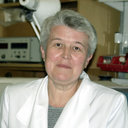[Vitamins and oxidative stress].
Keywords
Abstract
The central and local stress limiting systems, including the antioxidant defense system involved in defending the organism at the cellular and systemic levels from excess activation response to stress influence, leading to damaging effects. The development of stress, regardless of its nature [cold, increased physical activity, aging, the development of many pathologies (cardiovascular, neurodegenerative diseases, diseases of the gastrointestinal tract, ischemia, the effects of burns), immobilization, hypobaric hypoxia, hyperoxia, radiation effects etc.] leads to a deterioration of the vitamin status (vitamins E, A, C). Damaging effect on the antioxidant defense system is more pronounced compared to the stress response in animals with an isolated deficiency of vitamins C, A, E, B1 or B6 and the combined vitamins deficiency in the diet. Addition missing vitamin or vitamins restores the performance of antioxidant system. Thus, the role of vitamins in adaptation to stressors is evident. However, vitamins C, E and beta-carotene in high doses, significantly higher than the physiological needs of the organism, may be not only antioxidants, but may have also prooxidant properties. Perhaps this explains the lack of positive effects of antioxidant vitamins used in extreme doses for a long time described in some publications. There is no doubt that to justify the current optimal doses of antioxidant vitamins and other dietary antioxidants specially-designed studies, including biochemical testing of initial vitamin and antioxidant status of the organism, as well as monitoring their change over time are required.



